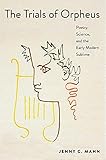The Trials of Orpheus : Poetry, Science, and the Early Modern Sublime / Jenny C. Mann.
Material type: TextPublisher: Princeton, NJ : Princeton University Press, [2021]Copyright date: ©2021Description: 1 online resource (296 p.) : 14 b/w illusContent type:
TextPublisher: Princeton, NJ : Princeton University Press, [2021]Copyright date: ©2021Description: 1 online resource (296 p.) : 14 b/w illusContent type: - 9780691219233
- Eloquence in literature
- English literature -- Greek influences
- English literature -- Early modern, 1500-1700 -- History and criticism
- LITERARY CRITICISM / Ancient & Classical
- Abjection
- Alchemy
- Aristaeus
- Aristotelianism
- Arthur Golding
- Astrophel and Stella
- Autoeroticism
- Bacchanalia
- Bacchides (play)
- Caelum
- Cato the Younger
- Claudian
- Creation myth
- Critique
- Cupid
- De Inventione
- De rerum natura
- Democritus
- Dionysus
- Doctor Faustus (play)
- Domitius Marsus
- Drama
- Elocutio
- Eloquence
- Epithet
- Epyllion
- Essay
- Euripides
- Excursus
- Explanatory gap
- Francis Beaumont
- Genealogia Deorum Gentilium
- George Gascoigne
- George Puttenham
- Giambattista della Porta
- Giovanni Boccaccio
- Greco-Roman mysteries
- Greek mythology
- Hermaphroditus
- Hermeticism
- Heroides
- Himeros (Parthian)
- Hippolytus (play)
- Inception
- Inventio
- Iphigenia in Aulis
- John Ashbery
- L'Orfeo
- Lingua (play)
- Lucretia
- Lucretius
- Maenad
- Magick (Thelema)
- Mephistopheles
- Michael Drayton
- Mimesis
- Mythology
- Mythopoeia
- Narcissism
- Occult
- Odysseus
- Orlando Furioso
- Orpheus and Eurydice
- Orphism (art)
- Ovid
- Parable
- Petrarchan sonnet
- Philip Sidney
- Philomela
- Philosopher
- Phlegra (mythology)
- Poetry
- Poliziano
- Propoetides
- Quintilian
- Rainer Maria Rilke
- Rhetoric
- Rhetorica ad Herennium
- Roland Barthes
- Salmacis
- Simile
- Sir Orfeo
- Sodomy
- Sonnets to Orpheus
- Sparagmos
- Superiority (short story)
- Supplication
- Synecdoche
- Terence
- Tereus (play)
- The Bacchae
- The Philosopher
- The Simulacra
- Threnody
- Tibullus
- Titus Andronicus
- Tragedy
- Trojan War
- Troubadour
- William Shakespeare
- 820.9/351 23
- PR418.O77 M36 2021
- online - DeGruyter
| Item type | Current library | Call number | URL | Status | Notes | Barcode | |
|---|---|---|---|---|---|---|---|
 eBook
eBook
|
Biblioteca "Angelicum" Pont. Univ. S.Tommaso d'Aquino Nuvola online | online - DeGruyter (Browse shelf(Opens below)) | Online access | Not for loan (Accesso limitato) | Accesso per gli utenti autorizzati / Access for authorized users | (dgr)9780691219233 |
Browsing Biblioteca "Angelicum" Pont. Univ. S.Tommaso d'Aquino shelves, Shelving location: Nuvola online Close shelf browser (Hides shelf browser)

|

|

|

|

|

|

|
||
| online - DeGruyter The New World : Infinitesimal Epics / | online - DeGruyter Earthly Delights : Poems / | online - DeGruyter The Spectre of War : International Communism and the Origins of World War II / | online - DeGruyter The Trials of Orpheus : Poetry, Science, and the Early Modern Sublime / | online - DeGruyter The Tolls of Uncertainty : How Privilege and the Guilt Gap Shape Unemployment in America / | online - DeGruyter The Rhetoric of Leviathan : Thomas Hobbes and the Politics of Cultural Transformation / | online - DeGruyter The Door in the Sky : Coomaraswamy on Myth and Meaning / |
Frontmatter -- Contents -- Illustrations -- Acknowledgments -- Introduction Trying -- Chapter one Meandering -- Chapter two Binding -- Chapter three Drawing -- Chapter four Softening -- Chapter five Scattering -- Conclusion Testing -- Notes -- Bibliography -- Index
restricted access online access with authorization star
http://purl.org/coar/access_right/c_16ec
A revealing look at how the Orpheus myth helped Renaissance writers and thinkers understand the force of eloquenceIn ancient Greek mythology, the lyrical songs of Orpheus charmed the gods, and compelled animals, rocks, and trees to obey his commands. This mythic power inspired Renaissance philosophers and poets as they attempted to discover the hidden powers of verbal eloquence. They wanted to know: How do words produce action? In The Trials of Orpheus, Jenny Mann examines the key role the Orpheus story played in helping early modern writers and thinkers understand the mechanisms of rhetorical force. Mann demonstrates that the forms and figures of ancient poetry indelibly shaped the principles of sixteenth- and seventeenth-century scientific knowledge.Mann explores how Ovid’s version of the Orpheus myth gave English poets and natural philosophers the lexicon with which to explain language’s ability to move individuals without physical contact. These writers and thinkers came to see eloquence as an aesthetic force capable of binding, drawing, softening, and scattering audiences. Bringing together a range of examples from drama, poetry, and philosophy by Bacon, Lodge, Marlowe, Montaigne, Shakespeare, and more, Mann demonstrates that the fascination with Orpheus produced some of the most canonical literature of the age.Delving into the impact of ancient Greek thought and poetry in the early modern era, The Trials of Orpheus sheds light on how the powers of rhetoric became a focus of English thought and literature.
Mode of access: Internet via World Wide Web.
In English.
Description based on online resource; title from PDF title page (publisher's Web site, viewed 01. Dez 2022)


